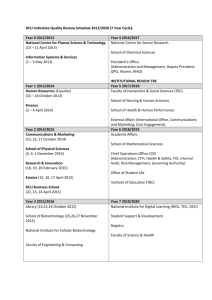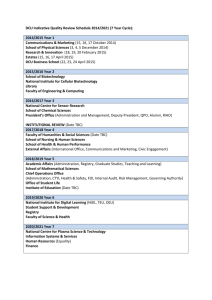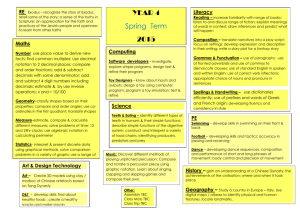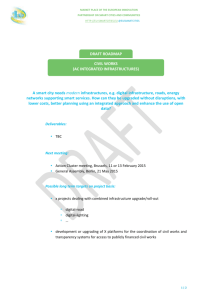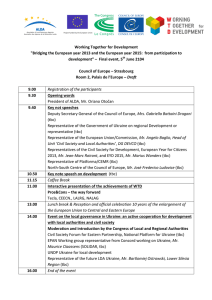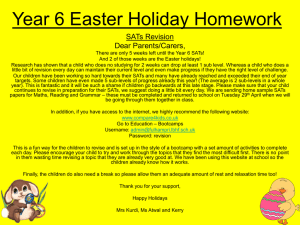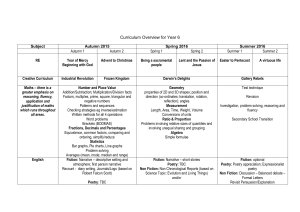Year 6 - William Law
advertisement
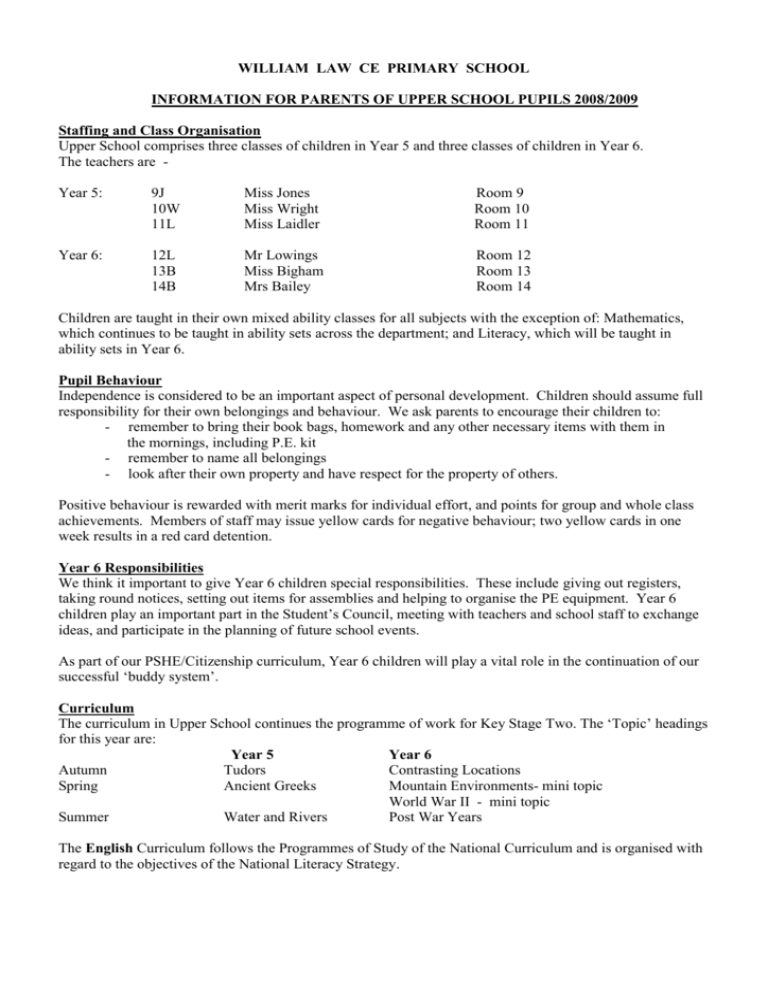
WILLIAM LAW CE PRIMARY SCHOOL INFORMATION FOR PARENTS OF UPPER SCHOOL PUPILS 2008/2009 Staffing and Class Organisation Upper School comprises three classes of children in Year 5 and three classes of children in Year 6. The teachers are Year 5: 9J 10W 11L Miss Jones Miss Wright Miss Laidler Room 9 Room 10 Room 11 Year 6: 12L 13B 14B Mr Lowings Miss Bigham Mrs Bailey Room 12 Room 13 Room 14 Children are taught in their own mixed ability classes for all subjects with the exception of: Mathematics, which continues to be taught in ability sets across the department; and Literacy, which will be taught in ability sets in Year 6. Pupil Behaviour Independence is considered to be an important aspect of personal development. Children should assume full responsibility for their own belongings and behaviour. We ask parents to encourage their children to: - remember to bring their book bags, homework and any other necessary items with them in the mornings, including P.E. kit - remember to name all belongings - look after their own property and have respect for the property of others. Positive behaviour is rewarded with merit marks for individual effort, and points for group and whole class achievements. Members of staff may issue yellow cards for negative behaviour; two yellow cards in one week results in a red card detention. Year 6 Responsibilities We think it important to give Year 6 children special responsibilities. These include giving out registers, taking round notices, setting out items for assemblies and helping to organise the PE equipment. Year 6 children play an important part in the Student’s Council, meeting with teachers and school staff to exchange ideas, and participate in the planning of future school events. As part of our PSHE/Citizenship curriculum, Year 6 children will play a vital role in the continuation of our successful ‘buddy system’. Curriculum The curriculum in Upper School continues the programme of work for Key Stage Two. The ‘Topic’ headings for this year are: Year 5 Year 6 Autumn Tudors Contrasting Locations Spring Ancient Greeks Mountain Environments- mini topic World War II - mini topic Summer Water and Rivers Post War Years The English Curriculum follows the Programmes of Study of the National Curriculum and is organised with regard to the objectives of the National Literacy Strategy. 1. Speaking and Listening Children will develop skills through opportunities for collaborative planning and discussion; individual and group presentations and formal and informal dramatic situations. They will also have opportunities to share their reading with others and to listen to a variety of stories. 2. Reading Children will have opportunities to explore preferences in their reading and to develop their interests in favourite authors and choice of subject matter. In the Upper School, emphasis is placed on developing reading strategies for reference material. 3. Writing Children will write more extended pieces of work covering a variety of themes. The skills of drafting and revising are developed and extended with emphasis placed on both content, and grammar and punctuation skills. Spelling skills are developed to include spelling patterns, rules and word derivations. The use of the dictionary and thesaurus is important. 4. Handwriting Handwriting skills continue to be taught in the Upper School and presentation of a high quality is expected from all children. Mathematics In Upper School we follow the guidelines in the National Numeracy Strategy. Children will be taught in streamed ability groups, with a strong emphasis on mental arithmetic and the practical application of mathematical skills. Formal written procedures are developed in practical contexts. A good knowledge of multiplication tables is important and should be consolidated at home. Mathematics homework will be set each week to consolidate work carried out in class. We consider homework to be a vital part of our Maths programme and cannot stress its importance enough. We encourage you to spend time discussing these tasks at home and to talk to your children about the methods used. ICT All Upper School children will have regular opportunity to use a variety of programs in their Literacy, Numeracy and Studies work, such as data handling and historical simulations. They will also have the opportunity to access the Internet. In addition, all children will receive training on how to word process, and how to use the PCs for research. As well as having access to classroom computers, children will have a lesson in the computer suite each week. Design Technology Children will be given the opportunity to use a variety of tools and materials including wood, card and clay, and to design a variety of artefacts. Children will also use a variety of construction kits, such as Lego Technic, to further develop their designing and problem solving skills. Sex Education The sex education programme will be taught, as part of Science and Personal / Social Education. In Year 5, children are taught aspects of personal hygiene, keeping healthy and about menstruation. The topic for Year 6 work is ‘Growing and Changing’; a unit, which has a strong emphasis on relationships, and covers both physical and emotional changes. The community nurse will be involved during these sessions. Physical Education normally takes place twice a week. Indoor activities will include gymnastics, themed dancing or creative dance. Outdoor activities will include athletics and a wide range of skills required for team games. Swimming lessons at the Peterborough Regional Pool are arranged in half term blocks. Year 5 children have the opportunity to swim during the Autumn Term, and Year 6 in the Spring Term. 2 As a reminder the school kit for PE is black/white/bottle green shorts plain white ‘T’ shirt white socks plimsolls/trainers swimming costume and towel (full piece for girls and boys trunks must be above the knee). a track- suit or sweatshirt top is advised. Children with longer than chin-length hair are asked to tie their hair back. All kit should be named. Homework Your child will have a homework book each term in which to record all homework information. Please look at this with your child. Children will be set a variety of activities to complete at home. Reading books should be taken home daily and we ask parents to help their children become independent readers, by insisting on regular reading and overseeing completion of their book reviews. A homework project, related to the Studies and having a ‘research’ element, will be set each term. We will give children guidance on the project but parental support would help to maximise the benefit of the work. On a weekly basis, children are expected to learn spellings and number facts [eg tables]. Class teachers may also set occasional items to research, in addition to the termly project. In some instances, children are asked to finish incomplete work during their own time, either during the lunch break or at home. Clubs and Extra-Curricular Activities There is a wide range of extra-curricular activities open to children in the Upper School during lunchtime and after school. Children are advised to read the activities notice board regularly. Tuition for those children who have started learning a musical instrument will continue in the Upper School. As many children cycle to school we encourage all Year 6 children to take part in the Safer Cycling scheme run by Cambridgeshire Road Safety. Special Upper School Events and Educational Visits Although some dates are still to be confirmed, many events and visits have been planned for the forthcoming year. Autumn Derbyshire Visit Secondary Transfer Meeting Visit to Ken Stimpson Visit to Lyveden New Bield Visit to London Visit to Burghley House 22- 26 Sept 18 September TBC 23 Sept 14 and 21 October TBC Year 6 Year 6 Parents Year 6 Class 9J Year 5 Year 5 Spring History visit Easter Service at St Johns Duxford Visit March TBC 2 April 12th/ 13th February Year 6 Year 5/6 Year 6 Summer SATs River Investigation 11-15 May TBC Year 6 Year 5 3 Visits to Lyveden New Bield Year 6 Concert Local Cycle Ride Leavers’ Service TBC TBC TBC 17 July [2pm] 10W and 11L Year 6 Year 6 Year 6 Parents at School Parental help with school activities is very much appreciated and warmly welcomed, whether on a regular basis or as a one-off for school visits. Parents wishing to help in some way should have a word with their child’s class teacher. If parents are, in any way, concerned about their child’s education or simply want to discuss matters relating to their child, the class teacher will be happy to see them. Usually the most convenient time is between 3:15 to 4:00 in the afternoon. Health Promoting Schools In line with our Health Promoting Schools Status, children are not allowed to eat sweets at school. We do advise that children drink plenty of water and because of the extended morning, we would also encourage children to bring in a sandwich or plain biscuit for break time in addition to something healthy such as a piece of fruit or vegetable. Standard Assessment Tests [SATS]. Throughout Key Stage 2, children are formally assessed through tests in English, Maths and Science. The Year 6 SATs take place during the week of 11-15 May. It is important that all children are at school throughout this week as well as beforehand when essential revision will be undertaken. There is no opportunity to retake the tests. Results of the SATs are reported to parents, along with teacher assessment of progress, in the end of year report. Year 5 children will also participate in SATs, although these are nonstatutory. Transfer to Secondary School Children transfer to Secondary school at the end of Year 6. In previous years the largest groups of children have transferred to Ken Stimpson Community School, Arthur Mellows Village College and The King’s School but children have also transferred to other Peterborough and Lincolnshire schools. During the Autumn Term, parents and children are invited to visit the various Secondary Schools. A booklet giving brief details of each of the schools, including their opening evenings, should have already been given to every Year 6 child. Details of the closing date for applications to Secondary School and the dates when parents are informed of the school in which a place has been allocated for their child are contained in the booklet. The Headteacher is available during the Autumn Term to advise about transfer arrangements and will hold a meeting for parents to talk generally about Secondary Transfer at 7.00pm on Thursday 18 September. In the Summer Term, prior to transfer, there is substantial liaison between the primary and secondary schools. Teachers from the different secondary schools visit and meet the children transferring to them and have an opportunity to discuss particular needs with the class teacher. Children are invited to spend a day or two at their new school, to experience a typical secondary school day, sampling lessons and finding their way round new buildings. Sarah Bigham Upper School Team Leader September 2008 4
